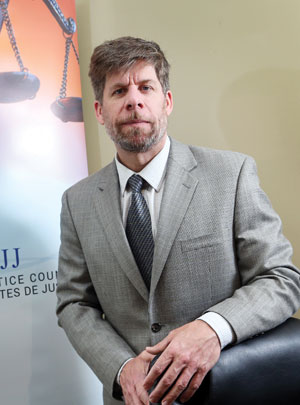Connection
Latest news
CACC Meets with UHM Voice of the Workers and Malta Government Lawyers
In 2022, UHM Voice of the Workers marked a significant milestone by negotiating the very first collective agreement for the Attorney General’s Office. The groundbreaking efforts of UHM Voice of the Workers have not gone unnoticed. Their achievements resonated across borders, drawing the attention of the Canadian Association of Crown Counsel (CACC). At a recent meeting on the sidelines of the Commonwealth Lawyers Association conference in Malta, representatives from the CACC engaged with UHM delegates to learn from their experiences.
[ ...More ]Publication date : 2025-04-11
A system in crisis: Rebuilding the dwindling Crown Attorney’s Office
With more files, more complex files and less resources, not surprisingly, Crown Attorneys are burning out and quitting. The lack of sufficient lawyers, especially experienced lawyers, has led to crisis in many provinces. Associations representing Crown Attorneys in Alberta, Ontario, New Brunswick and Nova Scotia have recently sounded the alarm...
[ ...More ]Publication date : 2025-03-14
Crown attorneys call on Manitoba government to help address ‘dangerously heavy caseloads’
The Manitoba Association of Crown Attorneys (MACA) is calling on the provincial government to help reduce mounting workloads that it says are making it difficult for prosecutors to meet their professional responsibilities. grievance it filed in April 2023. It says the grievance it filed back in April 2023 regarding 'dangerously heavy caseloads' won't be heard by an arbitrator until October 2025.
[ ...More ]Publication date : 2025-01-10
Preparing RCMP body-cam evidence for court will be monumental task, prosecutor says
The RCMP is phasing-in the use of body-worn cameras across the country and expects 90 per cent of frontline members to be wearing them within a year. Shara Munn, president of the New Brunswick Crown Prosecutors Association, said while the body-camera evidence will be great to have, it will also mean a huge influx of work for prosecutors.
[ ...More ]Publication date : 2025-01-06
N.L. government invests in 18 new Crown attorneys amid severe staffing crunch
Newfoundland and Labrador Justice Minister Bernard Davis announced Wednesday afternoon that the provincial government is investing nearly $24 million to improve the province's justice system.... The investment comes after CBC News reported in numerous stories that Crown attorneys in the province were "suffocating" from overwhelming workloads and a critical staffing shortage.
[ ...More ]Publication date : 2024-11-14
Newfoundland to add more Crown prosecutors
Newfoundland and Labrador has agreed to hire more Crown lawyers following cries of a shortage of prosecutors in the province. The “multi-year investment” will include the hiring of 18 new Crown lawyers, according to a news release.
[ ...More ]Publication date : 2024-11-13
<-- Back to archived news
Should prosecutors be able to run for political office?
13-04-2015

Len MacKay was part of an earlier committee that made a recommendation that would effectively grant prosecutors the right to run for office if they seek a leave of absence. Photo: Association of Justice Counsel.
Emilie Taman now has the support of the Association of Justice Counsel in her challenge of the decision. It cited the need for impartiality in precluding her from running in the upcoming federal election. Sources say Taman is seeking the NDP nomination in Ottawa-Vanier.
Association president Len MacKay says the union’s concern is the commission’s decision could set a precedent for a blanket ban on prosecutors who want to seek leaves of absence to pursue politics.
“We have taken up this application on her behalf to help protect her individual rights and freedoms, but of great concern to us as well is what precedent might be set by the process that was followed in Ms. Taman’s case,” says MacKay.
“In particular, it would appear that senior management strongly recommended that the prosecutor not be granted leave to run for office because of the impact on her impartiality.”
MacKay says Taman’s managers argued there was no way to protect the perception of Taman’s impartiality given her position and job description.
According to the association, the government could use the same reasons to deny any federal prosecutor the ability to run for office. The perception of impartiality is “a perfectly valid concept,” says MacKay.
“The problem we have, though, is if you look at the [commission’s] decision and the way they described the applicant’s duties, that description applies to virtually every prosecutor in the county, both provincial and federal,” he says.
The concern, then, is the bigger picture, he adds.
“Our concern is that this would amount to a blanket prohibition on at least federal prosecutors. We see it as a bigger battle as well.”
In her application for judicial review, Taman, a daughter of former Supreme Court of Canada justice Louise Arbour, is seeking to set aside the commission’s decision and a declaration that it violates the Constitution.
The commission “based its decision without regard for the material before it, by rendering a decision without regard to the specific duties performed by the applicant; instead, the [commission] based its decision on broad principles of prosecutorial discretion and the mandate of the entire office of the director of public prosecutions,” the application says.
When reached via e-mail, Taman declined to comment on the matter.
MacKay says Taman’s job is to handle prosecutions and notes her duties are “relatively routine.” However, there are cases where it would be legitimate to deny a federal prosecutor leave to run for office, he says.
“I could probably put together a particular prosecutor job description where we would be reluctant to perhaps take this battle on,” adds MacKay, noting that would include “politically sensitive” jobs that involved dealing almost entirely with the Elections Act or the Lobbying Act.
In 2004, another public prosecutor, Maureen Harquail, challenged a decision by the commission denying her leave to seek a nomination in that year’s federal election. By the time Federal Court had dealt with the matter, however, the election had come and gone and the application was moot. Still, the court found problems with how the commission had arrived at its decision.
The commission ended up granting Harquail leave to run in the subsequent election and she’s again running as a Conservative candidate in Don Valley East in this fall’s federal vote.
“It’s a shame that 10 years later, we’re going through the same kind of arguments,” says Harquail, who’s now general counsel at the Ontario Racing Commission.
“Frankly, that was one of the main reasons why I left the Department of Justice. I didn’t want to go through this kind of battle every time I wanted to seek a nomination. I’ve been able to pursue a political life working with the Ontario government and it’s been a much easier process,” she adds.
Harquail says she understands the concept of impartiality but feels that principle should apply to people holding more senior roles within the public prosecutor’s office instead of stopping “line prosecutors” from putting their names on the ballot.
“I’m very passionate about the ability of a public servant to seek office and to serve the public in another way,” she says. “To limit someone’s ability to put their name on a ballot, I mean that’s what our country is made of. It’s democracy and to not be able to put your name on a ballot, that’s a big problem for me.”
Harquail says her duties in 2005, when the commission granted her leave to seek office, were the same as the work she was doing when it found otherwise a year earlier. Asked if she thinks her Federal Court challenge of the first decision influenced the second outcome, she says, “Who knows?”
In 1997, current Justice Minister Peter MacKay ran into the same hurdle when he sought leave from his job as a Crown to pursue a Progressive Conservative nomination in Halifax.
After a rejection by the prosecution services in Halifax and his subsequent challenge of that decision, the matter concluded in a settlement that permitted MacKay’s political pursuit and promised a review of the statute.
Len MacKay, then a provincial prosecutor in Halifax, was part of the committee that reviewed the legislation and made a recommendation that would effectively grant prosecutors the right to run for office if they seek a leave of absence.

